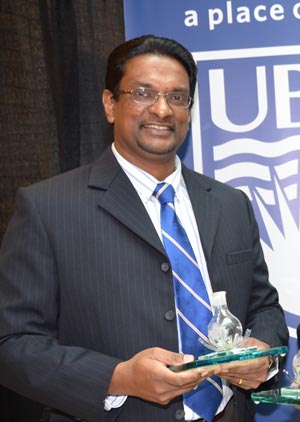
School of Engineering Assoc. Prof. Kasun Hewage
Terms like sustainability, environmentally friendly, green, and recyclable have been around for decades. But when it comes to construction, are those labels applicable? Is there such a thing as an environmentally friendly highway project, or even a recyclable building?
Engineers at UBC’s Okanagan School of Engineering think so. Assoc. Prof. Kasun Hewage says environmental concerns including climate change and the reduction of natural resources mean tomorrow’s engineers need to re-think everyday building projects. Students in the university’s Life-cycle Management Lab are being encouraged to integrate life-cycle thinking within infrastructure management — whether it is a new road, bridge, or building.
“We’re asking our students to look at the entire life-cycle production process,” says Hewage. “We want them to look at the starting point of each piece of material, right through to the end-point of life. We need to look at the environmental, economic, and even the social impacts of every bit of material used in that building.”
Hewage says it goes well past green building materials and environmentally sustainable methodology. He takes the analysis further, down to computer monitors, doors, windows, and even desk-top supplies such as pens, phones, print materials. The life-cycle assessment includes raw materials: the manufacture, transportation and installation of those materials, and the operation, maintenance, recycling, or eventual waste management of those same items.
“Everything has a start-point and an end-point of life. When they stop being of use to us, such as a computer monitor, how do we dispose of it? This must all be part of the life-cycle assessment of the projects our engineering students are working on.”
Plans and grant applications for the Life-cycle Management Lab began in 2009; to date more than $500,000 has been raised, mostly through grants. The lab is equipped with high-capacity computers and state-of-the-art software to conduct micro- and macro-level life-cycle assessments, a smart board, and high-resolution remote cameras. Currently 16 graduate students are doing research in the facility.
“We think of our campus as a living lab and we have green roofs and we teach about green materials, but we also want to take this outside the campus,” says Rehan Sadiq, professor and acting director of UBC’s School of Engineering. “We are thinking about professional development opportunities for engineers in our community and we hope to eventually develop a graduate course in life-cycle thinking.”
The next big step for UBC’s engineers is a Canadian industry standard where building materials can officially be labeled Earth-friendly. Sadiq says while it’s early days for this idea, life-cycle thinking is a natural progression for all types of construction and development.
The life-cycle management research at UBC is turning heads. Hewage says colleagues are looking at systematic processes that can help asset managers and urban planners make informed decisions, which can have far-reaching results decades into the future.
—30—